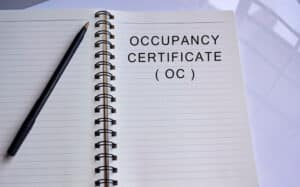Ocean County Certificate of Occupancy Attorneys
Providing Support to Clients in Real Estate Transactions in Holmdel, Beach Haven, Red Bank, Brick, Freehold, and elsewhere in Southern New Jersey

In New Jersey, obtaining a certificate of occupancy (CO) from local authorities is necessary before using any residential or commercial property space. The CO attests that requirements have been complied with appropriately, considering diverse variables like zoning laws, regional construction codes, and related standards governing building safety. Other factors in this document include the address, type of occupancy (classification under which usage occurs), the number of rooms, necessary permits attached, and specifics concerning any restrictions on permissible activities (whether personal or commercial). The CO does not guarantee that the building on the property is in perfect condition or not in need of some repairs but meets the minimum standards to be occupied.
When purchasing or selling a property, it is always recommended to count on the support of an experienced real estate attorney who is up to date with what the law demands to make sure your steps toward your goals are the right ones. You can trust Peter J. Bronzino, Esq., and his team of attorneys to handle your real estate transaction and all of the questions you may have regarding the Certificate of Occupancy in Toms River, Asbury Park, Manasquan, Sea Girt, Berkeley, Wall, and all Monmouth and Ocean County areas in Southern New Jersey. Contact our local offices in Brick or Sea Girt by calling (732) 812-3102.
What Type of Assurance Can a Certificate of Occupancy Provide in New Jersey?
A crucial element in ensuring occupant welfare throughout multiple jurisdictions is adhering to strict guidelines set by governing bodies. Developers must obtain proof that their property meets these standards via certification provided upon completion, referred to as a “certificate of occupancy.” Inspections confirming compliance with zoning regulations and other pertinent safety measures are then carried out. It should be noted that failure to possess this documentation further along the line can lead to illegal consequences. Those planning on leasing commercial space (such as establishments for business) are further obliged and need proper documentation before legitimate operation.
The certificate of occupancy offers its occupants a certification indicating proof that all construction work was carried out in line with established safety practices. This helps to prevent unscrupulous contractors from skimping on essential procedures, avoiding potential hazards posed to individuals occupying these spaces. Most insurers require a CO as part of their due diligence before they will insure a property, as it lowers the possibility of liability in the future. It is an assurance that the structure has been built to code.
Scenarios Where a Certificate of Occupancy is Necessary in NJ

If you are building a new home, commercial building, or another type of structure, you will need a certificate of occupancy before occupying the building. In some cases, a certificate of occupancy may be required when selling or leasing a property.
When you change the use of an existing building, such as converting a residential property into a commercial property or vice versa, you will need a certificate of occupancy. This is because different types of buildings have different building codes and zoning regulations.
Making significant changes to an existing building, such as adding a new room or making structural changes, could require a certificate of occupancy to ensure that the changes comply with local building codes and regulations. If you are making improvements to a commercial space for a tenant, such as adding new walls or changing the layout, you may need a certificate of occupancy to show that the space is safe and compliant with local building codes.
Fines and Penalties for Not Having a Certificate of Occupancy in New Jersey
In New Jersey, occupying or using a building or structure without a valid certificate of occupancy is illegal. If you do not have a certificate of occupancy and are found to be using or occupying a building, you may face penalties and fines. Also, if someone is hurt on your property, you could be liable for their injuries. The specific penalties and fines for not having a certificate of occupancy in New Jersey can vary depending on the local ordinances and regulations. The penalties include fines, legal fees, and possibly being forced to vacate the premises.
In addition, if you do not have a certificate of occupancy, it may be difficult to obtain financing or insurance for the property. This is because lenders and insurance companies typically require a certificate of occupancy to ensure that the property is safe and compliant with local building codes. If the building is under construction and there is no certificate of occupancy, a stop work order can be enforced until everything is in legal order. Adherence to the order costs thousands in fines for each day of unallowed construction.
A landlord who does not have one will not only be fined but is at risk of losing the unpaid rent of renters who move out without paying. If the property is rented without a viable certificate of occupancy, the renter’s contract is illegal. Consequently, in Khoudary v. Salem Board of Social Services, 260 N.J.S. 79 (App. Div. 1992), the Court ruled against a landlord who rented a dwelling without a certificate of occupancy and wanted to sue the people who skipped out on their rent. The court determined that it could not support the suit against the renters because the owner came before the court with “dirty hands” as the rental agreement was illegal, and he could not request the court’s help to resolve an unlawful action. The court did find, however, that if the renters did not pay, they could be evicted.
Steps to Obtain a Certificate of Occupancy in New Jersey
To get a certificate of occupancy, you must first obtain the specific requirements and procedures that are particular to your local area. Your local building department should be able to provide them once you offer the specifics about your property and what you plan to use it for.
Any construction or renovations require building permits. You cannot begin construction until the permit applications are approved. Once the building permit applications have been approved, you have to schedule inspections with the local building department during and after the project is completed. Trained inspectors will check the building from stem to stern; if any issues are identified, they must be corrected before your certificate of occupancy is given.
Once the inspections have been completed and any issues have been addressed, the Bureau of Housing Inspection department will issue a certificate of occupancy and you are free to move in, rent, lease, or sell your property.
How Can An Attorney at Bronzino Law Firm Guide You Through Certificates of Occupancy in NJ?
Hiring an attorney can help ensure that obtaining a CO in New Jersey goes as smoothly as possible and that your property is safe and legal for occupancy. Our attorneys at the Bronzino Law Firm are well-versed in real estate law and we assist clients with these matters in Point Pleasant, Tinton Falls, Middletown, Little Egg Harbor, and other communities in Monmouth and Ocean County.
Our attorneys have worked on many real estate cases, and we will make sure everything runs like clockwork. When it comes to your questions about the aspects of a real estate contract, certificates, contingencies, home inspections, and all of the legal details, our attorneys are familiar with all of the ins and outs of real estate law.
Call our office today for a consultation at (732) 812-3102 or complete our online contact form, and you will hear from us shortly.







